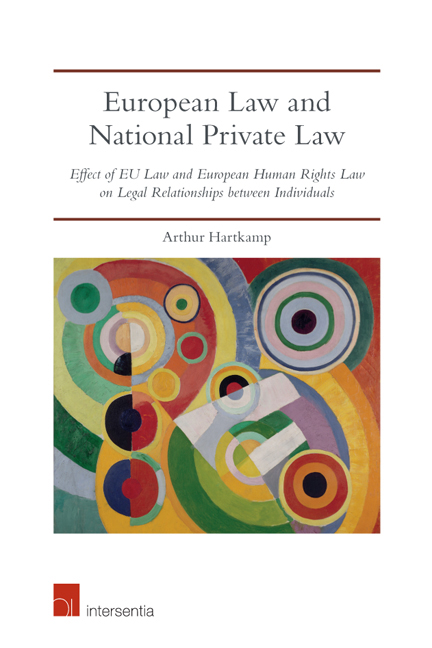 European Law and National Private Law
European Law and National Private Law Book contents
- Frontmatter
- Preface
- Contents
- Table of Cases
- Table of Legislation
- List of Abbreviations
- Part I Sources of European Law and Their Influence on National Private Law
- Chapter 1 Introductory Observations
- Chapter 2 The Tfeu and Private Law
- Chapter 3 General Principles of EU Law and Private Law
- Chapter 4 Directives and Private Law
- Chapter 5 Regulations and Private Law
- Chapter 6 Fundamental Rights and Private Law
- Part II Overview of Directives and Scholarly Projects in General Private Law
- Bibliography
- Index
Chapter 3 - General Principles of EU Law and Private Law
from Part I - Sources of European Law and Their Influence on National Private Law
Published online by Cambridge University Press: 22 September 2018
- Frontmatter
- Preface
- Contents
- Table of Cases
- Table of Legislation
- List of Abbreviations
- Part I Sources of European Law and Their Influence on National Private Law
- Chapter 1 Introductory Observations
- Chapter 2 The Tfeu and Private Law
- Chapter 3 General Principles of EU Law and Private Law
- Chapter 4 Directives and Private Law
- Chapter 5 Regulations and Private Law
- Chapter 6 Fundamental Rights and Private Law
- Part II Overview of Directives and Scholarly Projects in General Private Law
- Bibliography
- Index
Summary
GENERAL PRINCIPLES OF EU LAW
In its case law, the Court of Justice has developed a large number of general principles of Community law, currently EU law. These are fundamental principles of justice of the EU and its member states (cf. AG Trstenjak, opinion in Audiolux, C-101/08, point 70), ‘deeply rooted principles without which a civilised society would not exist’. They have a general, comprehensive character that is inherent in general principles of law. According to recent case law of the ECJ they have a constitutional nature or constitutional status (Audiolux, paragraph 63; NCC, C-174/08, paragraph 42). They belong to primary law, which means they are on an equal footing with the treaties.
In Audiolux the ECJ gave an insight into the considerations that play a role when recognising a general principle of EU law. The ECJ was dealing with the question whether EU law includes a general principle of equal treatment of shareholders, which in the case under consideration would have meant that if one of the large shareholders acquired the company, a small number of minority shareholders would be entitled vis- à-vis this large shareholder to receive the same price for their shares as was received by other large shareholders. The ECJ answered the question in the negative, because secondary EU legislation contained insufficient grounds for such a rule protecting shareholders and because it was an issue regarding which various means were available for ensuring such protection which the legislature was in a better position to weigh than the courts – also in the light of the principle of legal certainty. The ECJ further held that the proposed principle was characterised by a degree of detail that required further legislation.
FUNCTIONS OF THE GENERAL PRINCIPLES OF EU LAW
The ECJ has held itself competent to develop general principles of EU law pursuant to Article 220(1) EC (currently the second sentence of Art. 19(1) TEU), which imposes a duty on the ECJ to ensure that in the interpretation and application of the treaties ‘the law is observed’. The principles have a largely public law bias, which is not surprising given the socio-economic and administrative background of European cooperation.
General principles of Union law are held to possess three or four functions. They play a role in interpreting provisions of written law, in supplementing gaps in the law and in assessing the legality of legislative or administrative acts.
- Type
- Chapter
- Information
- European Law and National Private LawEffect of EU Law and European Human Rights Law on Legal Relationships between Individuals, pp. 95 - 134Publisher: IntersentiaPrint publication year: 2016


